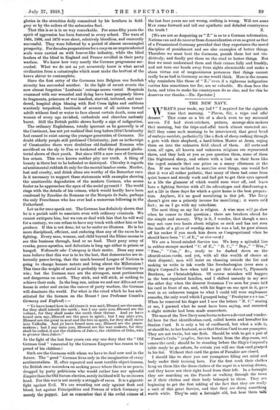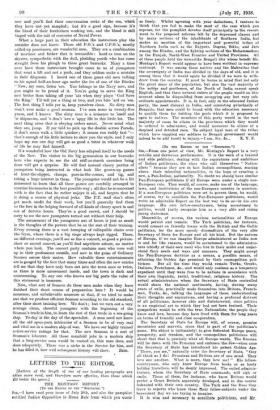THE NEW NAVY.
WHAT'S your trade, my lad?" I inquired for the eightieth time that morning. "Please, Sir, a tripe and offal dresser." This came as a bit of a shock even to my seasoned nerves. I'd had rivet-catchers, putters, sausage-skin-makers that morning, but the tripe-and-offal touch almost unseated me. Still they come each morning to be interviewed, that great band of embryo matelots, pathetically like a flock of sheep rushing through a gate with their shepherd, a hard-bitten Master at Arms, urging them on into the unknown field ahead of them. All sorts and sizes, all ages, all known and unknown religions are represented there, and they look at you as you question them, some of them like frightened sheep, and others with a look on their faces like the caged animals that one pities on a sunny afternoon at the Zoo. If one was inclined to moralize over things, one would feel that it was all rather pathetic, that many of them had come from quiet homes and steady work and had got to get their eyes opened to a life the glamour of which would soon wear off, and leave bare a fighting Service with all its advantages and disadvantaw s. not a life in these days for which a quiet home is the best prepara- tion. Anyhow, it's no good moralizing in this job. The Navy doesn't give one a princely income for moralizing ; it wants cold fact ; so on I go with my catechism.
The next thing on my list is religion. A wise man will go slow when he comes to that question ; there are breakers ahead for the simple and unwary. Why is it, I wonder, that though a man may not care two hoots about religion as such and has not Eisen the inside of a place of worship since he was a lad, he goes almost off his rocker if you mark him down as Congregational when he should have been "C. of E.," or vice-rered
We are a broad-minded Service too. We keep a splendid lino in rubber-stamps marked "C. of E.," "R. C.," "Bap.," "Wee.," " Pres.," "Con.," &c., ready to be dashed down on the identification-cards, and yet, with all this wealth of choice at their disposal, men will insist on choosing outside the list and making us write in ink words like Swedenborgian (ever seen a Ship's Corporal's face when told to get that down ?), Plymouth Brethren, or Christadelphian. Of course mistakes will happen in the best-regulated families, and I shifted uneasily in my seat the other day when the dourest Scotsman I've seen for years laid his card in front of me, and, with his finger on one spot in it, gave vent in an unknown tongue to what I could tell were unpleasant remarks, the only word which I grasped being " Presbyter-r-r-r-ian.'" When he removed his finger and I saw the letters "R. C." staring at me, I guessed what he must have been saying, and surmised a slight mistake had been made somewhere.
The man of the New Navy soon learns to have a devout and wonder-
ful love for that identification-card, called herein and hereafter his Station Card. It is only a bit of cardboard, but what a wife is, or should be, to her husband, so is that Station Card to our youngster. They are not twain, but one flesh. Should he wish to get a pair of " Pusaer's Crabs" (anglice, Service boots) from the slop-room, out comes the card ; should he be standing before the Ship's Corporal's table ready to go ashore, be certain you will see that card grasped in his fist". Without that card the gates of Paradise are closed.
I should like to show you our youngsters filling out mind and body under their training here. For the first week their clothes hang on them like the dress-clothes of the super in a touring drama, and they know not their right hand from their loft. In a fortnight they are marching on the Parade or walking through the town as if their clothes and their body belonged to them. They are beginning to get the first inkling of the fact that they are really a unit of this great Service, and that they are doing something worth while. They're only a fortnight old, but hear them talk
now and you'll find their conversation reeks of the sea, which they have net yet sampled ; but it's a good sign, because it's the blood of their forefathers working out, and the blood is still tinged with the salt of centuries of Naval Power.
What a large part in their education the instructors play the outsider does not know. Those old P.O.'s and C.P.O.'s, mostly called-up pensioners, are wonderful men. They are a combination of martinet and father that is irresistible : hard as iron on the shyster, sympathetic with the dull, plodding youth who has come straight from his plough to these great barracks. Many a time over have those instructors brought cases to us of youngsters that want a lift and not a push, and they seldom make a mistake in their diagnosis. I heard one of those great old men talking to his squad half-an-hour ago under the lee of one of the Blocks, "Now, my sons, listen 'ere. You belongs to the Navy now, and you ought to be proud of it. You're going to serve the King now better than taking off your 'ate when they plays God Save the King.' I'll tell yer a thing or two, and you bite 'ard on 'em. The fust thing I tells yer is, keep yerselves clean. No dirty man, won't ever make a good seaman. I've seen some in twenty-five years, and I knows. The dirty man is a nuisance to 'itself and 'is shipmates, and 'e don't 'ave a 'appy life in this little lot. The next thing arter that is obeying orders smart. Never mind what they are, jump. If yer told to pick up the double across Parade, it don't mean walk a little quicker ; it means run ruddy fast "- that's enough of his little lecture to show you the style, and I only hope my son one day will get as good a tutor in whatever walk of life he may find himself.
It's wonderful how the Old Navy has adapted itself to the needs of the New. The visitor to the big gymnasium in our barracks here who expects to see the old stiff-as-starch exercises being done will get a surprise. He will find instead cheery parties of youngsters being instructed in what look like grown-up games of hunt-the-slipper, clumps, puss-in-the-corner, and tig, and taking a huge interest in them. The youngster would not be a bit interested to learn that all these games are carefully arranged to exercise his muscles in the best possible way ; all that he is concerned with is the fact that he rather enjoys it all, and forgets that he is doing a course of physical jerks. The P.T. staff don't often get much credit for their work, but you'll generally find them to the fore in the helping forward of all kinds of cheery sport in and out of Service hours. They're a good crowd, and I should be sorry to see the new youngsters turned out without their help.
The amusement of the youngsters out of hours is just as much in the thoughts of the powers that be as the rest of their training.
Every evening there is a vast humping of collapsible chairs over the Gym, where there is a big stage always kept rigged. There, on different evenings, you'll see as fine a concert, as good a picture- show or sacred concert, as you'll find anywhere ashore, no matter where you look. The concert party contains men who were well up in their professions outside, and now in the guise of Ordinary Seamen amuse their mates. How valuable these entertainments are is gauged by the fact that many times and often the new entries tell me that they have only been out into the town once or twice, as there is more amusement inside, and the town is dark and uninteresting. To any one who knows our big ports the value of this statement is immense.
Now, what sort of Seamen do these men make when they have finished their short course of preparation here ? It would be nonsense, and unbelievable nonsense at that, if we tried to make out that we produce efficient Seamen according to the old standard, after their short training here. We don't ; but we turn out a very average clean, cheerful youngster with the beginning of the Seaman's trade in him, to learn the rest of that trade in a sea-going ship. To-day is the day of the specialist. A man need not know all the old spun-yarn intricacies of a Seaman to be of very real and vital use in a modern ship of war. We have our highly trained active-service ratings for that. The new Seaman is a sort of Seaman's labourer. All those manifold jobs in a modern ship that a long-service man would be wasted at, this man does, and does adequately. There was a niche in the Service for him, and
he has filled it, how well subsequent history will show. Bran.



































 Previous page
Previous page